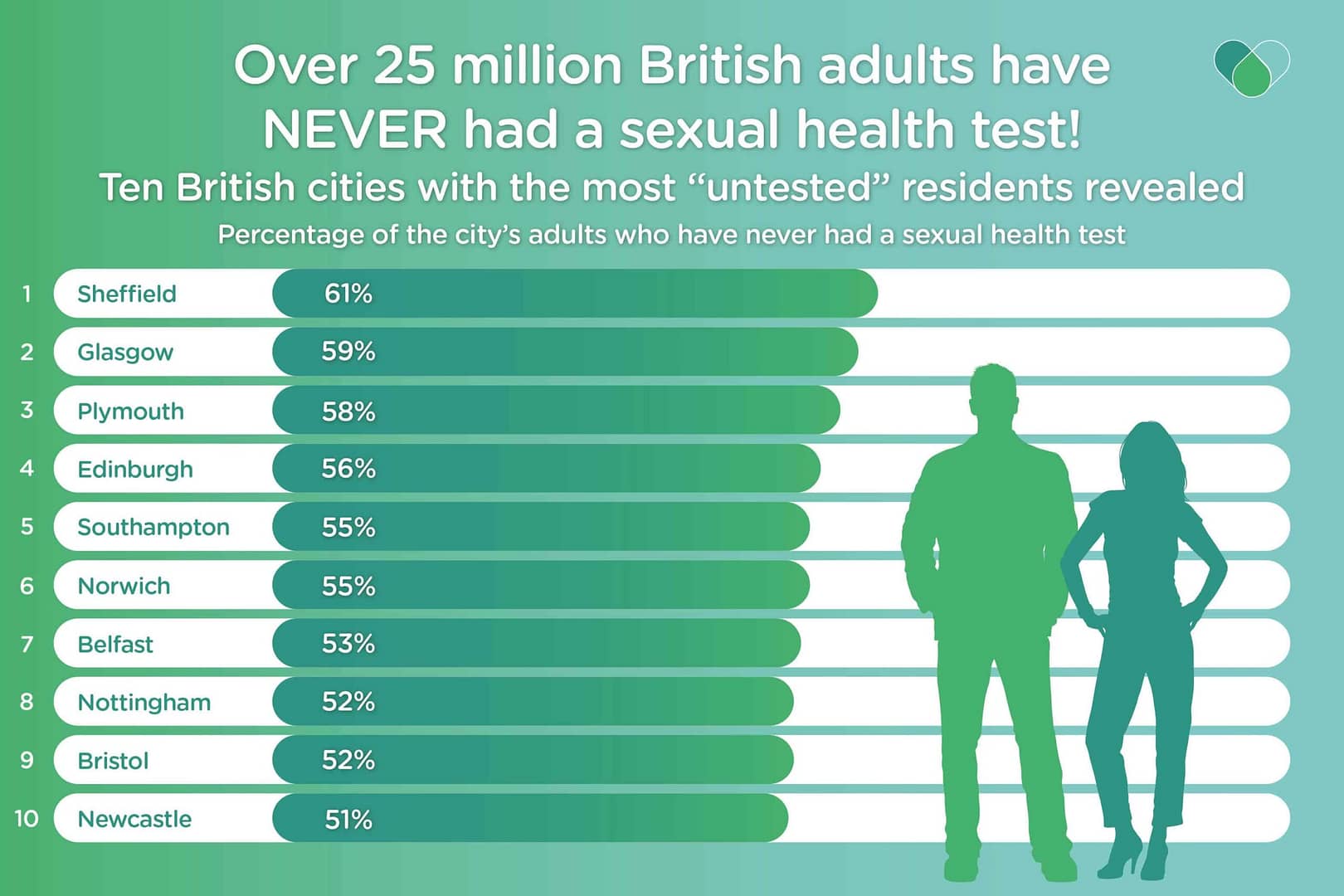Summer 2023 is here, which means that hen and stag do season is well underway. Here at Your Sexual Health, we wanted to find out the “truth behind” British hen and stag culture and the role that sex plays in the popular bachelor and bachelorette get-togethers.
In June 2023, we surveyed 2,000 UK adults (aged 18 or over) to see just how cautious Brits are when it comes to having unprotected sex on a hen/stag do and what their attitudes are towards cheating.
Read the surprising statistics below, which cover both the attitudes of Brits across regions and insights based on age, gender, relationship status, and more.

Risk of STD boom as Brits head off for hen/stag dos
Having unprotected sex increases the risk of STD transmission, but is that a common practice on hen and stag dos? We’ve got the answer.
Over 10 million (10.5 million), or one in five (20%) Brits have or would have unprotected sex on a hen/stag do
14% of respondents admitted that they have had unprotected sex on a bachelor/bachelorette party and 6% admit that they would do it. What’s more, 6.8 million people are more likely to do so on a stag/hen do than on an average day.
These figures alone suggest that over 10 million Brits are at risk of coming back from what’s meant to be a fun couple of nights away with a sexual health disease.
But is it just singletons that are at risk? Not quite!
Over one in six (17%) Brits have or would have unprotected sex with someone that’s not their partner whilst on a hen/stag do
10% of respondents have done this before and 7% would do it. Unsurprisingly, the majority (64%) of Brits class this as cheating and said their wedding would be off if their partner ever did this.
We segmented our research based on regions, and shockingly, Birmingham residents are most likely to have unprotected sex with someone that isn’t their partner when on a stag/hen do; almost a quarter, 23% say they have or would do this.
On the other hand, Southampton residents appear to be the least likely to cheat in this way, with 86% saying they have not had/would not have unprotected sex with someone that isn’t their partner.
Is taking protection on a stag/hen do cheating?
Over a quarter (27%) of the survey respondents said that they have or would take protection on a stag/hen do if they’re in a relationship. While this is the responsible thing to do, over a third (35%) of Brits class the act of just taking protection on a stag or hen do as cheating.
Condoms can help prevent the spread of the most common sexually-transmitted infections, such as chlamydia, gonorrhoea and HIV, but they can’t stop the transmission of genital herpes, syphilis and HPV.
This means that even if people have protected sex on a stag/hen do, they still run the risk of coming back with an STI. In such cases, testing is crucial to ensure they’re not risking their own or their partner’s sexual health.
But are Brits testing once they’re back?
Over one in ten (11%) Brits have never or would never get tested after having sex with someone other than their partner
A lot of STIs don’t show any signs or symptoms, including chlamydia, which is one of the most common STIs in the UK. A huge 70% of women and 50% of men with chlamydia don’t get any symptoms and that’s not the only STI that can go unnoticed.
The result? All of those who have or are planning to have sex with someone other than their partner while on a stag/hen do and come back without getting tested are at risk of continuing the spread of STDs and even infecting their partner.
And infections are not uncommon; over one in ten Brits (11%) confess that they have caught an STD whilst on a trip/holiday, and shockingly half of these (5%) have done so on more than one occasion.
Do those that get tested know when to do it?
Most STIs aren’t detectable straight away. People are usually required to wait at least 14 days before testing for chlamydia or gonorrhoea and 28 days before testing for HIV, syphilis, hepatitis B, and hepatitis C. And it turns out that well over a quarter of Brits don’t know when to test for an accurate result.
A guide to how long each takes to show up on a test and the testing method:
• Chlamydia/Gonorrhoea – 14 days – urine swab
• Genital Herpes – 14 days – blood, urine or swab
• HIV – 28 days – blood
• Hepatitis B and C – 28 days – blood
• Syphilis – 28 to 84 days – blood
34% of Brits are likely to get a false negative because of testing too early
Although it’s encouraging that the majority of people would get tested after having sex with someone other than their partner, our survey shows that 34% would test too early, so even if they had contracted chlamydia or gonorrhoea, their test might return a false negative result.
In addition, almost half of Brits (48%) run the risk of getting a false negative even if having contracted HIV, syphilis or hepatitis as they would test too early (10% would wait up to a week, 24% – one to two weeks and 14% – two to three weeks after they’re back).
These findings suggest that it’s both important to get tested but it is also crucial to test at the right time.
Are Brits getting tested for STIs?
As part of investigating when and if survey respondents would get tested after a stag/hen do, we came across some shocking truths:
Almost half (48%) of Brits have NEVER had a sexual health test
Regular testing is fundamental for reducing the number of STI transmissions. While protection and symptom monitoring can help, they can’t be relied on.
Dr Rashid Bani, GP and Medical Director for Your Sexual Health, says: “Testing regularly can identify even asymptomatic STDs, which can prevent serious health complications down the line.” He warns: “Taking one test can be the difference between getting simple treatment (e.g. taking antibiotics) versus not being able to conceive.”
In fact, STIs can cause infertility and increase the chances of a miscarriage in women and can also cause infertility in men.
Based on our survey, we found that residents of the following cities are most at risk as they have the biggest percentage of untested residents:

With sexually-transmitted infections on the rise among the over-65s, we looked into the impact of demographics on STI testing.
We found that 72% of survey respondents of the age of 55+ have never had a sexual health test. In comparison, a quarter (25%) of respondents who were of the age of 25-34 had never had an STI test. While this is still a high proportion of people, it is obvious that STI awareness amongst the older generation must be improved.
Here at Your Sexual Health, we have 100+ clinics nationwide where you can get tested for all common and rare sexually transmitted infections, including chlamydia, gonorrhoea and HIV. Find the nearest clinic and book a test today.
Top tips for staying STI-free this hen/stag do season
According to Dr Bani, GP and Medical Director for Your Sexual Health, these are the top tips for keeping STIs away this season:
- Get tested: If you have sex with a new partner while you’re away, get a full STI test once you’re back. Standard NHS tests usually check for chlamydia, herpes, syphilis, gonorrhoea and HIV, but you could also opt for more comprehensive private tests which also check for less common sexually transmitted infections such as hepatitis, trichomonas vaginalis and gardnerella vaginalis, amongst others.
- Don’t test too early: Remember to wait for the appropriate number of days (28 days for standard tests and 14 days for early detection tests). Testing is the most trustworthy way of identifying a possible infection but they need to be taken at the right time.
- Use protection: Condoms can help reduce transmission of some STIs, so even if they’re not 100% effective, they can help reduce your chances of getting infected. However, remember to get tested once you’re back even if you’ve used protection.
- Be honest: Being open and honest about your sexual health and history with any partners gives them the opportunity to take any precautions they also feel are necessary to protect themselves. It’s both respectful and more safe to do so.
- Remember: It’s not just intercourse that can spread STIs. Other sexual acts can leave you at risk, as well as non-sexual acts such as injecting drugs. HIV and hepatitis can be passed through sharing needles.
